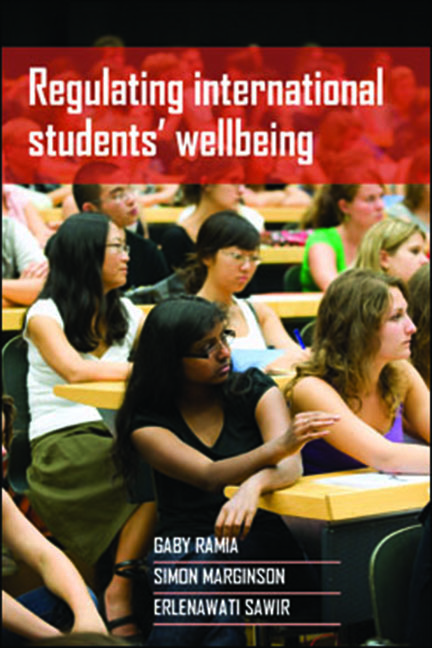Book contents
- Frontmatter
- Contents
- List of figures and tables
- Acknowledgements
- Preface
- one Introduction: global students and their discontents
- two Governing globalisation? National regulation and international student wellbeing
- three Fast growing, diverse: mapping the business of international education
- four ‘There’s gold in them thar students!’ Australia and New Zealand in the global market
- five Much regulation, minimal protection: the Australian model
- six Pastoral care, minimal information: the New Zealand model
- seven Different frameworks, similar outcomes: comparing Australia and New Zealand
- eight Doing it differently: national and global re-regulation and trans-national student citizens
- nine Conclusion
- References
- Index
nine - Conclusion
Published online by Cambridge University Press: 03 February 2022
- Frontmatter
- Contents
- List of figures and tables
- Acknowledgements
- Preface
- one Introduction: global students and their discontents
- two Governing globalisation? National regulation and international student wellbeing
- three Fast growing, diverse: mapping the business of international education
- four ‘There’s gold in them thar students!’ Australia and New Zealand in the global market
- five Much regulation, minimal protection: the Australian model
- six Pastoral care, minimal information: the New Zealand model
- seven Different frameworks, similar outcomes: comparing Australia and New Zealand
- eight Doing it differently: national and global re-regulation and trans-national student citizens
- nine Conclusion
- References
- Index
Summary
Managing global mobility
In international education, the language that appears in formal regulation does not reflect the student experience on the ground. Given the evidence uncovered through interview data with students and service and policy staff, the Australian regime is not entirely true to the promise of the ESOS Framework to provide ‘student welfare and support services’ and ‘nationally consistent standards for dealing with student complaints and appeals’ (DEST, 2007b, Part A.3.1). The New Zealand Pastoral Care Code comes closer than Australia to fulfilling its stated raison d’être: ‘to provide a framework for education providers for the pastoral care of international students’ (MOENZ, 2011a, p 2). Yet New Zealand's Code does not deliver ‘welfare’ (Part 5) as reasonably defined by social scientists, and although the Code does provide for nationally consistent ‘grievance procedures’ (Part 7), this is not achieved for enough students who simultaneously know about it and need it.
In both Australia and New Zealand the necessary flow of regulatory information to students is deficient. The analyst who digs beneath the surface of the formal regulatory rhetoric is led to look for the unofficial and less explored ways in which students seek to augment their own welfare. Regulation theory helps in the process of determining how everyday experiences are shaped by forces that are not obvious to the untrained eye. Theory also assists in examining what lies beyond the informal arrangements that students make in the context of a system that our analysis has found to be overly reliant on the global market forces that govern international education. The problem we set out to investigate has led to a conceptual lens which is not common in the field of international education. It produces the conclusion that Australia and New Zealand both use formal regulation to service the competition state strategy that they pursue with equal vigour.
Signature contributions to regulation theory in recent years emphasise several key concepts discussed in this book, but these start form one central point: that the traditional understanding of regulation as a top-down process using command and control – and as deriving directly from the state to the citizen – falls short of explaining how individuals, societies and economies are affected by regulation.
- Type
- Chapter
- Information
- Regulating International Students’ Wellbeing , pp. 155 - 160Publisher: Bristol University PressPrint publication year: 2013



